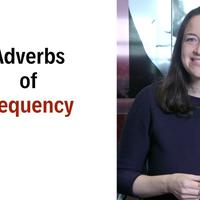Adverbs of frequency: How to use them and where they go in a sentence - English In A Minute - YouTube
Welcome to BBC Learning English.
I'm Sam and today we're going to look at
adverbs of frequency.
You know these!
Always, sometimes, never.
But where do they go in a sentence?
Look at 'always' in this sentence.
Does it come before or after the verb?
Helen always starts work at seven.
The verb is 'starts' and 'always' comes before
– rule number one.
Next sentence:
Helen isn't always happy about this.
The verb is 'is' and 'always' was after
– rule number two
Last sentence:
Helen has always hated early starts.
Trick question!
There was an auxiliary verb 'has' and a main verb 'hated'
and 'always' went after the auxiliary verb
– rule number three

